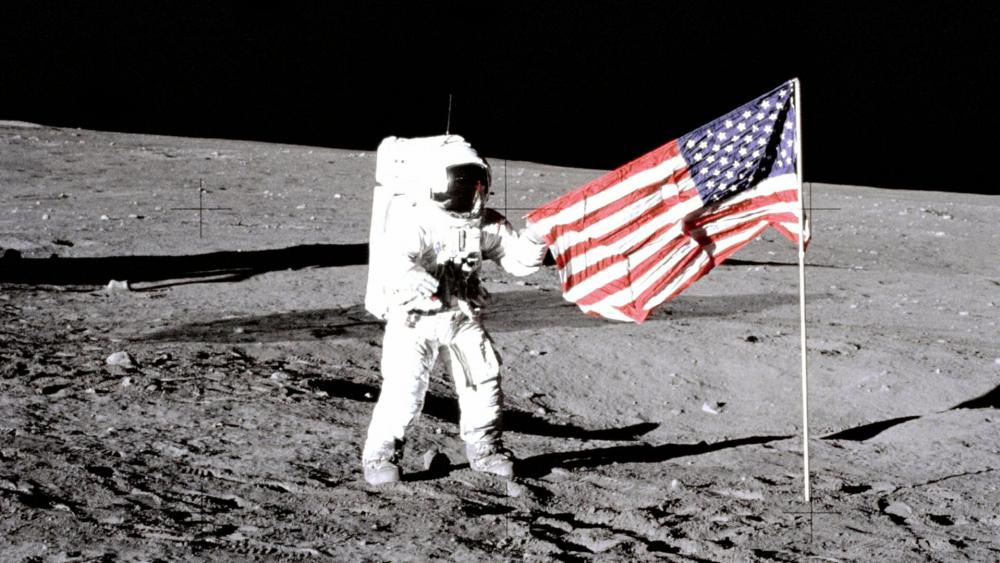'Let There Be Light': How God Kept Appearing Over and Over During America's Missions to the Moon
WASHINGTON – On July 20, 1969, man first touched the surface of another world when Neil Armstrong and Buzz Aldrin walked on the moon. Though conquering space certainly marked a triumph for science and mankind, God kept coming up in conversations on these missions to the moon.
Historian William Federer, the author of the daily online history lesson AmericanMinute.com, points to the Apollo 11 moonwalkers.
"Before they got out of the lunar module, they had a moment of silence and Buzz Aldrin celebrates communion," Federer said of that day. "He pours the grape juice in one-sixth gravity and it does a slow little circle. He reads John 15: 'I am the vine, you are the branches.' And he takes bread that was partly consumed at the communion service before he launched…he saved a piece of the bread. And he celebrated communion. So the first items that were consumed on the moon was communion."
Atheist Peeved Over Public Reading of Genesis in Space
The world didn't hear it because a famous atheist had given NASA grief over Apollo 8 astronauts publicly reading from the Bible.
"He asks for radio silence because Madalyn Murray O'Hair had threatened to sue because the Apollo 8 had mentioned God," Federer said of Aldrin and his quiet communion. "They read from the Book of Genesis."
Lunar Module Pilot William Anders began their Christmas Eve, 1968 broadcast saying, "The crew of Apollo 8 has a message that we would like to send to you: 'In the beginning, God created the heaven and the earth. And the earth was without form and void and darkness was upon the face of the deep. And the Spirit of God moved upon the face of the waters. And God said, 'Let there be light.' And there was light.'"
As Apollo 11 headed back to earth, Aldrin said to a listening world, "This has been far more than three men on a mission to the moon. Personally, and reflecting on the events of the past several days, a verse from Psalms comes to mind: 'When I consider the heavens, the work of Thy fingers and the moon and the stars which Thou hast ordained, what is man that Thou art mindful of him?'"

Houston, They Had a Problem
Nine months later, when an accident occurred on board Apollo 13 that might have doomed its three astronauts to die in space, much of the planet turned to God.
Federer said of that week, "President Nixon calls the nation to pray. And they have a prayer on the Chicago Board of Trade, in the Vatican, and the Wailing Wall…all around the world."
Their prayers were answered and after many trials, the crew of Apollo 13 was saved. President Richard Nixon met with the astronauts in Honolulu, Hawaii, and said of them, "The exploration of space has been a hazardous adventure. The voyage of Apollo 13 dramatized its risks. The men of Apollo 13 by their poise and skill under the most intense kind of pressure, epitomized the character that accepts danger and surmounts it."
It was a rare moment when a united mankind thanked God.
"President Nixon has a national day of thanksgiving to celebrate this," Federer explained. "And the cover of Time Magazine is the astronauts praying, and this was put on all kinds of memorabilia that the whole nation prayed."
One of the last Apollo flights featured Mission Control's Charles Duke getting to walk on the moon. He spoke of it later.
"Charles Duke is a great Christian," Federer noted. "He's an astronaut and he says, 'I used to think that…' – paraphrasing here – '…going to the moon would be my greatest achievement. But my walk with Jesus is more memorable because it's an everyday affair'."
"Just a fascinating faith that Charles Duke had," he continued. "Plus all the astronauts: Jim Irwin – Apollo 15 – became an evangelical minister. And Apollo 14 left a microfilm copy of the King James Bible on the moon."
It's interesting to note how many of those men who flew far into the heavens couldn't get the God of heaven out of their thoughts.



